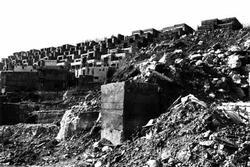In the Streets of Jerusalem: Discovering What Jewish Space Means to Me
While walking through the markets of Jerusalem with my mother (who is white), I couldn’t help but notice waves of heads turning my way out of the corner of my eye. I diverted my focus to how amazing the produce in Israel is, and had to help myself when I saw a vendor selling freshly squeezed orange juice.
“Hi, I would like the orange juice,” I said to the man at the counter.
He looked at me in disbelief and asked my mom, “How did you get her to speak English so well?”
My mom replied, “She’s my daughter,” and smiled. The man looked at us blankly.
“She’s adopted from China,” my mom continued. The man nodded, forced a smile, and handed me my juice.
I was ready to forget about the exchange as I contentedly sipped on my juice and looked around at the array of shops.
Suddenly, I heard a man call: “Ah, Pocahontas!”
There was no one near us that resembled Pocahontas, so I continued walking through the market.
“Pocahontas! Over here!” The man repeated, and I realized he was talking to me. I wasn’t particularly insulted—I personally thought the guy was just being dumb—but my mom was enraged.
“Excuse me? Ani midaberet ivrit! (I speak Hebrew!)” my mom yelled.
“Mom, I think we should just keep walking.” I said, quietly.
Instead, my mom approached the men, shouting in Hebrew and scolding them for their inappropriate remark. Finally, we walked on. I joked, “If anything, I would’ve been Mulan, but at least Pocahontas is pretty.”
At the Western Wall, I felt hyper aware and mildly confused. The numerous stares wondering, “what is someone like her doing here?” and the polite shuffling away from me didn’t bother me, though, as much as the self-inflicted obligation to feel a great sense of something, which I did not feel.
I've never been a person who felt a great connection to the religious aspects of Judaism, so, looking back, I don’t know what exactly I expected. This wall was supposed to be the holiest place for the Jewish people. I knew Jews spent years dreaming of seeing this place, but I was standing there and feeling absolutely nothing. I looked up and all I could think was, wow, this is a big wall. I wrote my prayer on a little sheet of paper and shoved in the cracks of the Wall—I still felt nothing. The photos from that day make it seem like I was deep in spiritual thought, but in reality, I was just impressed by the physical height and length of the Wall.
Throughout my many years of Hebrew school, I was taught that Israel was supposed to be my second home, but I never really took this statement to heart. After I finally traveled there, I realized this couldn’t be further from the truth for me. After that day, I was able to acknowledge—I think due to my “American-ness” and the microaggressions I experienced—that I didn’t feel as though or want Israel to be my second home. Although I thought it was a great country to visit, it was not somewhere I felt like I “fit right in'' or found extreme comfort in; but, I would definitely travel back just to eat the killer falafel and schnitzel.
In retrospect, I wonder what type of great connection thirteen-year-old me was even supposed to experience. Honestly, I don’t know if I would feel something if I went back to Israel now. I don’t think the microaggressions I faced there had to do with connection, because I’ve been faced with more microaggressions in New Jersey, a place I happily call my home state. (Yes, I know that’s a controversial statement.) I think being a person that feels a deep connection to a place, simply put, is not who I am or who I am going to be. For me, it’s hard to see a whole country as “home,” especially as a person who traveled there for a vacation.
In general, religious services, landmarks, and spaces have never really resonated with me, and I’m often left questioning if I’m Jewish enough every time I attend them. Perhaps because I constantly hear comments about my race and belonging when I walk into Hebrew school, services, or even the streets of Jerusalem, I’ve never felt like those so-called Jewish spaces were “home” or a comfortable place for me.
There is, however, a silver lining: my discomfort in designated Jewish spaces allows me to find comfort in the friends and communities I've built for myself. When I look at it this way, I feel as though all of the painful, awkward discrimination I’ve experienced maybe contains a blessing in disguise. Many people struggle for a long time to create their own meaning from Judaism, but because my Jewishness has always been questioned by other Jews, I’ve been forced to craft my own Jewish identity; the one that was taught to me, never felt like it was truly for me.
Since my dispiriting experience in Israel, I’ve reflected on the fact that Judaism is important for different reasons for different people. It took me leaving an all-Jewish space to realize that there’s no one thing that makes someone Jewish, and there’s no such thing as being “Jewish enough.” It’s a journey and, to this day, I still find myself questioning my Jewish faith when I’m in religious spaces. The beauty of religion may be the prayer for some people but, for me, undoubtedly, it's the personal connections it enables me to have.
This piece was written as part of JWA’s Rising Voices Fellowship.






